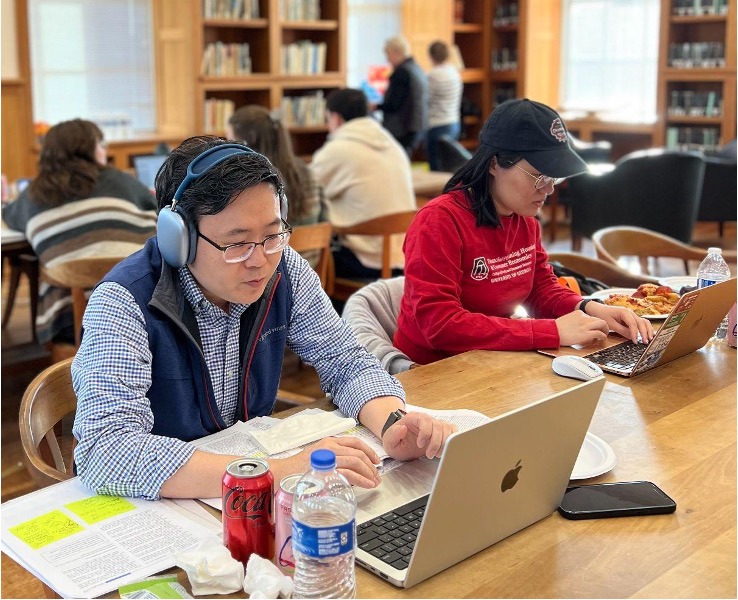On March 19, more than 50 graduate students from across campus gathered in the Miller Learning Center’s Reading Room for a writing retreat, joined by a team of three retreat coordinators and three UGA Writing Center consultants. This event was made possible with funding from the Graduate School.
For several years, Write@UGA and the Office of Faculty Affairs have supported a faculty writing retreat each May, and the Parents Leadership Council has provided funding for two undergraduate writing retreats each year, one in the fall and one in the spring. This spring, retreat coordinators Elizabeth Davis, Lindsey Harding and Sara Steger—all writing program administrators and English department faculty—thought it was time to extend this sort of programming to graduate students. While space was limited to the first 50, nearly 150 students registered for the retreat, which suggests that a writing retreat seemed to be just the thing for graduate students, too: time and space to focus on their writing projects, with dinner, coffee, snacks and refreshments to keep them locked in and plugging away on their work.
For the students who participated, the retreat was productive. Graduate students worked on their dissertations and theses, journal article manuscripts, comprehensive exams, papers for classes and other projects, including preparing for a conference, compiling a literature review and drafting an invention disclosure.
“I got more done in the six hours of the retreat than all week and look forward to the next one,” said microbiology Ph.D. student Rachel Dockman, who attributed this achievement to the atmosphere and community the retreat provided. “I appreciate having a quiet place with other students who are in the same place as me academically and working towards similar goals. There is a sense of camaraderie, despite the fact that I did not know other students, and I work better with gentle ‘peer pressure.’”
This idea of generating motivation and inspiration from writing in a group was a common refrain echoed among other graduate students who shared their thoughts on the event in the week that followed.
“The Reading Room is such a lovely space to work in, being around so many people who are also working and intensely focused made me feel more motivated and supported in my work,” said Sofia Ruiz, an M.F.A. in performance student in the Department of Theatre and Film Studies.
Other students stressed the value of structured support in the form of time to devote to writing. “Having structured writing retreats for graduate students is vital for those working on a thesis or dissertation. Graduate students have a lot of things to juggle. By providing this structured support, it allows graduate students to plan for time to devote to their own writing,” said Mariliz Kastberg-Leonard, a political science Ph.D. student.
Graduate students, just like the undergraduate students and faculty who have attended writing retreats hosted in the Reading Room, not only found the event to be useful but also expressed interest in signing up again for future writing retreats. The retreat feedback survey suggests strong interest in monthly writing retreats. At this one, graduate students felt cared for, supported, encouraged, motivated and focused, all of which contributed to the productivity they sustained and the work they accomplished.
“[The retreat] provides a larger block of time set aside to write than is usually possible when there are typical household or office distractions,” said Louise Milone, a history Ph.D. student who also stressed how important dedicated and supported time for writing is for graduate students. “It helps me to focus on where I am with a project and where I need to be and to get going on it.”


